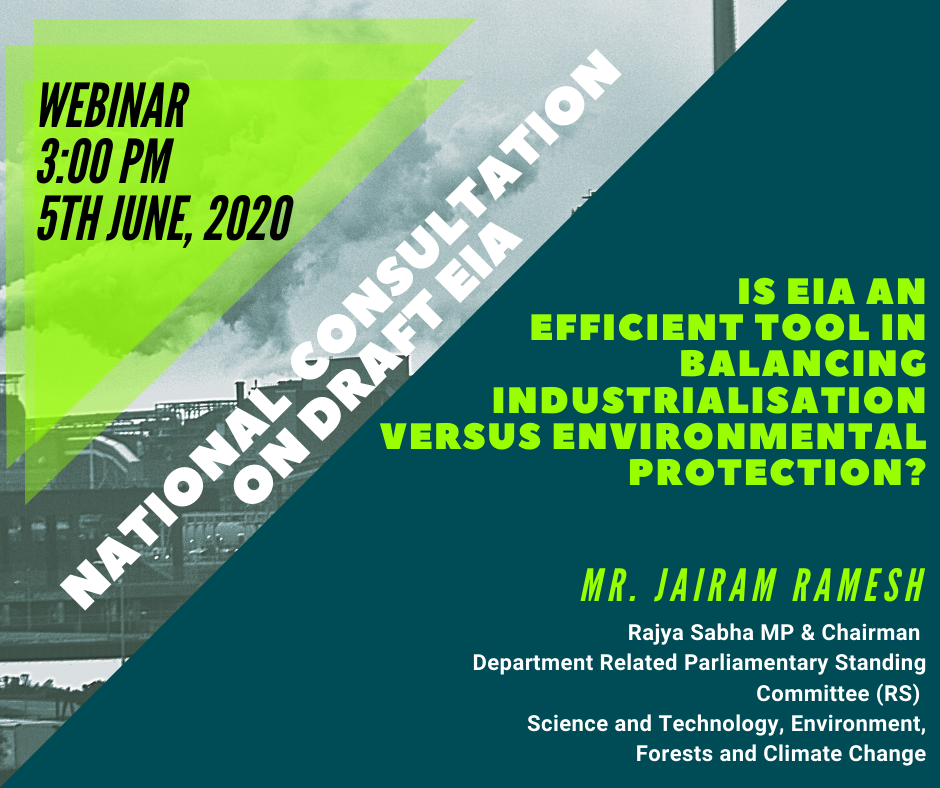National Consultation On Draft EIA 2020, Environmental Protection And Justice
Virtual Meet on June 05, 2020

As habitat destruction and biodiversity loss continues unabated across the globe, pandemic spread of diseases like coronavirus (COVID-19) may just be an instance of a new normal. Rapid destruction of forests could increasingly expose human populations to wild pathogens, as humans spread their influence deeper into the ecosphere. Besides, more situations could arise where pathogens jump to human hosts.
The degradation of ecosystems has a cascading effect on wildlife and livelihoods of millions of natural resource dependent people. This also results in erosion, even loss, of cultures, constitutes gross environmental and social injustices intricately linked to Right to Life.
India has a variety of laws to protect wildlife, forests, biodiversity, control pollution, and also recognize forest rights, all tied under the umbrella Environment Protection Act 1986. For specifically regulating industrial, infrastructure and urban development and extractive activities, India brought into effect the Environment Impact Assessment Notification in 1994. This subordinate legislation was comprehensively recast in 2006 overlooking widespread disagreements over its purpose and contents.
Being a subordinate law, it was easy for the Ministry of Environment, Forests and Climate Change (MoEF&CC) to amend it at will, essentially diluting its provisions disregarding environment safeguards and human rights. This was done through various amendments, but also through order and circulars so written not to clarify, but confound. And confounded it did even Judges of the National Green Tribunal and Supreme Court, who directed the Ministry to compile and clarify to the wide public the intent, purpose and operation of this law. The proposed 2020 amendment is the Ministry’s response to directions and it appears to have grabbed the opportunity to comprehensively justify all dilutions to EIA Notification 2006.
Interestingly, the draft EIA Notification 2020 was issued by MoEF&CC on March 23, a day before the Prime Minister announced a nation-wide lockdown due to COVID pandemic. Through an online notice public comments were invited in the next 60 days (ending May 22). It is difficult to imagine that the Union Environment Minister was not privy to the impending lockdown decision and thus raises doubts if it was deliberately issued on the eve of the lockdown. It is deeply disturbing that a law that has wide reaching impacts on India’s environment, forests and human rights, was issued at a time when most fundamental freedoms were restricted or unavailable. Simply stated, it is impossible to meaningfully participate in the shaping of this law during a lockdown, as the right of association to critique the law, a fundamental feature of Right of Expression, is unavailable.
Since then, numerous organisations have written to MoEFCC asking the notification be withdrawn and the exercise reinitiated when true democratic participation of the public is possible in an environment conducive to discuss and debate. In response, the Ministry has deferred the last date for commenting to June 30.
From a summary reading of the draft EIA 2020, it becomes evident, apart from the fact that it is a consolidation of dilutions of EIA 2006, it is promoted primarily to serve the interests of the investor, industrial and business community at the cost of environment and human rights. Timelines for securing environmental clearances are shortened; validity of clearances for mining and riverbed related projects are increased by years; clearances for expansion projects is being done away with; and the exclusion list for projects exempted from environmental clearance mechanism has expanded. Moreover, a subordinate law is being used by the executive wing of the Ministry to infringe on powers of other Ministries, such as the Ministry of Tribal Affairs which oversees implementation of Forest Rights Act, and steps on Fundamental Rights contained in Biodiversity Act, and various other constitutionally endowed rights. Further, by such acute centralisations proposed, through a mere subordinate law, the Central Government proposes to weaken federated governance as enshrined in the Constitution.
To debate and discuss all these critical issues and concerns, CAG, ESG and MAUSAM invite your participation in the consultation on 5 th June 2020, also World Environment Day, on Google Meet, between 3-6 pm. To participate, please register at https://forms.gle/6TMyW4iVpDVKMemq9
Organisers:
Citizen consumer and civic Action Group (CAG)
Environment Support Group (ESG)
Movement for Advancing Understanding on Sustainability And Mutuality (MAUSAM)

